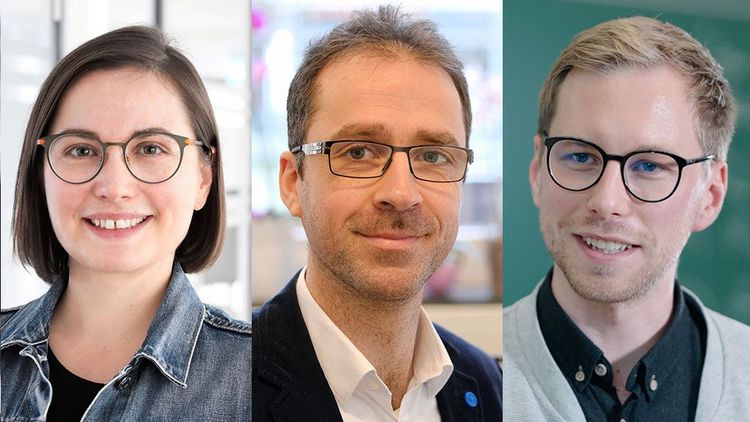How does everyday noise influence the work of the human brain? Oldenburg neuroscientist Martin Bleichner is investigating this question and has received this year's "Prize for Excellent Research" from the University Society. Two recent doctoral graduates are also being honored.
Three researchers have been awarded prizes by the Universitätsgesellschaft Oldenburg e.V. (UGO) this year: neuroscientist Dr Martin Bleichner won the Award for Excellent Research endowed with 5,000 euros, while computer scientist Dr Marion Koelle and mathematician Dr Ingo Schoolmann each received an Outstanding Doctoral Thesis Award, which is endowed with 2,000 euros.
UGO Award for Excellent Research
Neuroscientist Dr Martin Bleichner has been a lecturer and researcher in the Psychology Department for eight years. For the past two years, the 40-year-old has led the “Neurophysiology of everyday life” research group as part of the German Research Foundation's Emmy Noether Programme. The project aims to study brain activity in response to environmental noise and objectify the subjective noise disturbance. To do this Bleichner’s team uses mobile electroencephalography, placing electrodes around the ear in combination with a signal amplifier to record electrical activity in the brain. The collected data is then combined with the noise that is recorded simultaneously via smartphone. Bleichner studied cognitive science in Osnabrück and cognitive neuroscience in Utrecht in the Netherlands, where he also earned his PhD.
UGO Award for Outstanding Doctoral Thesis
In her dissertation "Designing socially acceptable body-worn cameras”, computer scientist Dr Marion Koelle combines empirical user research, design, software and hardware prototyping of cameras with aspects of artificial intelligence. Her focus here is the social component of human-machine interactions, with the aim of designing technology that fits seamlessly into people's day-to-day social life. She has received multiple awards for her work, including the Helene Lange Prize in 2020, jointly awarded to young scholars by the EWE Foundation, OFFIS – Institute for Information Technology and the city of Oldenburg. Koelle transferred to the University of Oldenburg in 2016 and completed her PhD under the supervision of Prof. Dr Susanne Boll. Recently she has been conducting research at Saarland University into technologies worn directly on the skin that are sustainable, aesthetic and non-stigmatizing.
UGO Award for Outstanding Doctoral Thesis
Dr Ingo Schoolmann is the first mathematician to receive the UGO Prize for Outstanding Doctoral Thesis. His work focuses on long-standing unsolved mathematical problems. His doctoral thesis “Hardy spaces of general Dirichlet series and their maximal inequalities” garnered much attention in the world of mathematics. The thesis combined subfields of analysis – such as functional analysis, abstract harmonic and complex analysis – and “opened a window that had been closed for decades” on the theory of general Dirichlet series, as his PhD supervisor Prof. Dr Andreas Defant emphasized. Schoolmann did a teaching degree in Oldenburg in mathematics, politics and economics before completing his Master's in mathematics in 2016. He completed his doctoral thesis, which was funded by the German Research Foundation, in February 2021 with summa cum laude honour. The 30-year-old is currently working as a software developer at OHB Digital Services GmbH.

